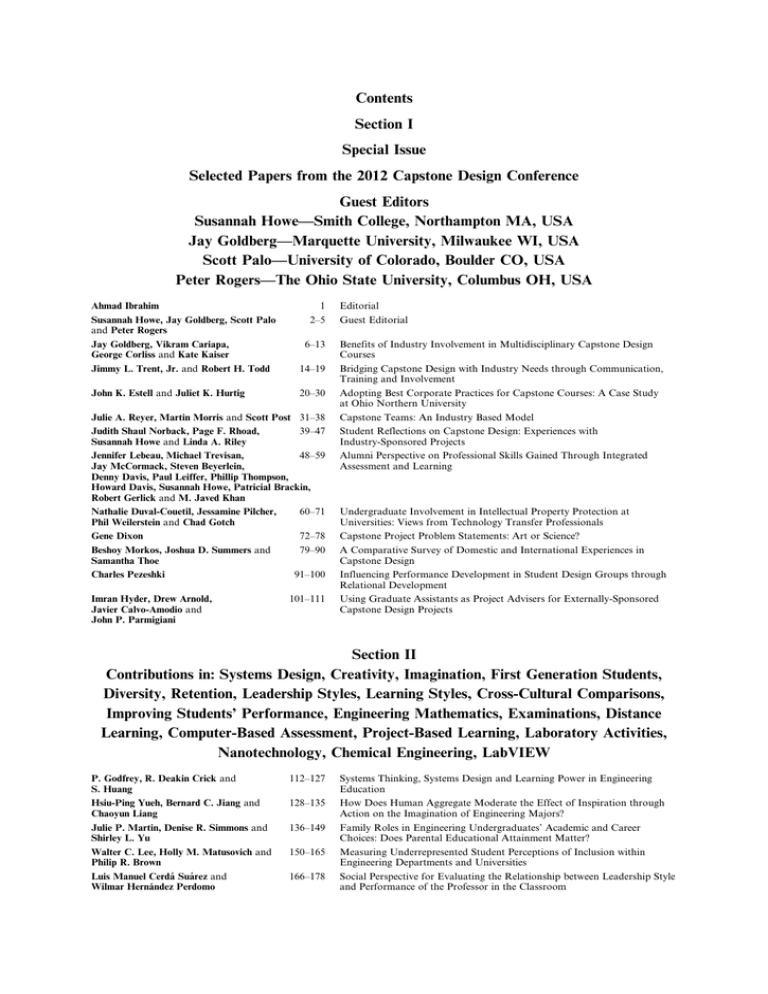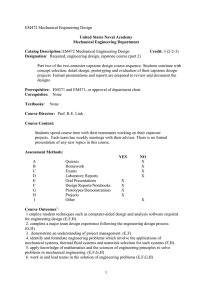Contents Section I Special Issue Selected Papers from the 2012 Capstone Design Conference
advertisement

Contents Section I Special Issue Selected Papers from the 2012 Capstone Design Conference Guest Editors Susannah Howe—Smith College, Northampton MA, USA Jay Goldberg—Marquette University, Milwaukee WI, USA Scott Palo—University of Colorado, Boulder CO, USA Peter Rogers—The Ohio State University, Columbus OH, USA Ahmad Ibrahim Susannah Howe, Jay Goldberg, Scott Palo and Peter Rogers Jay Goldberg, Vikram Cariapa, George Corliss and Kate Kaiser Jimmy L. Trent, Jr. and Robert H. Todd 1 2–5 14–19 John K. Estell and Juliet K. Hurtig 20–30 6–13 Julie A. Reyer, Martin Morris and Scott Post 31–38 Judith Shaul Norback, Page F. Rhoad, 39–47 Susannah Howe and Linda A. Riley Jennifer Lebeau, Michael Trevisan, 48–59 Jay McCormack, Steven Beyerlein, Denny Davis, Paul Leiffer, Phillip Thompson, Howard Davis, Susannah Howe, Patricial Brackin, Robert Gerlick and M. Javed Khan Nathalie Duval-Couetil, Jessamine Pilcher, 60–71 Phil Weilerstein and Chad Gotch Gene Dixon 72–78 Beshoy Morkos, Joshua D. Summers and 79–90 Samantha Thoe Charles Pezeshki 91–100 Imran Hyder, Drew Arnold, Javier Calvo-Amodio and John P. Parmigiani 101–111 Editorial Guest Editorial Benefits of Industry Involvement in Multidisciplinary Capstone Design Courses Bridging Capstone Design with Industry Needs through Communication, Training and Involvement Adopting Best Corporate Practices for Capstone Courses: A Case Study at Ohio Northern University Capstone Teams: An Industry Based Model Student Reflections on Capstone Design: Experiences with Industry-Sponsored Projects Alumni Perspective on Professional Skills Gained Through Integrated Assessment and Learning Undergraduate Involvement in Intellectual Property Protection at Universities: Views from Technology Transfer Professionals Capstone Project Problem Statements: Art or Science? A Comparative Survey of Domestic and International Experiences in Capstone Design Influencing Performance Development in Student Design Groups through Relational Development Using Graduate Assistants as Project Advisers for Externally-Sponsored Capstone Design Projects Section II Contributions in: Systems Design, Creativity, Imagination, First Generation Students, Diversity, Retention, Leadership Styles, Learning Styles, Cross-Cultural Comparisons, Improving Students’ Performance, Engineering Mathematics, Examinations, Distance Learning, Computer-Based Assessment, Project-Based Learning, Laboratory Activities, Nanotechnology, Chemical Engineering, LabVIEW P. Godfrey, R. Deakin Crick and S. Huang Hsiu-Ping Yueh, Bernard C. Jiang and Chaoyun Liang Julie P. Martin, Denise R. Simmons and Shirley L. Yu Walter C. Lee, Holly M. Matusovich and Philip R. Brown Luis Manuel Cerdá Suárez and Wilmar Hernández Perdomo 112–127 128–135 136–149 150–165 166–178 Systems Thinking, Systems Design and Learning Power in Engineering Education How Does Human Aggregate Moderate the Effect of Inspiration through Action on the Imagination of Engineering Majors? Family Roles in Engineering Undergraduates’ Academic and Career Choices: Does Parental Educational Attainment Matter? Measuring Underrepresented Student Perceptions of Inclusion within Engineering Departments and Universities Social Perspective for Evaluating the Relationship between Leadership Style and Performance of the Professor in the Classroom Ning Fang and Xiuli Zhao 179–188 V. Kovaichelvan and R. Nandagopal 189–198 Desmond Adair and Martin Jaeger 199–209 Arthur James Swart and Trudy Sutherland 210–217 Charles Xie, Zhihui Zhang, Saeid Nourian, Amy Pallant and Edmund Hazzard Weijane Lin, Hsiu-Ping Yueh and Jui-Jen Chou Ming-Der Jean 218–230 Carlos V. Miguel, Luis C. Matos, Fernão D. Magalhães, Luis M. Madeira and Adélio Mendes Yücel Uğurlu 231–239 240–253 254–262 263–271 272 Cross-Cultural Comparison of Learning Style Preferences between American and Chinese Undergraduate Engineering Students Improving the Performance of Engineering Students with Aspiration, Innate Ability through Competency based Education Making Engineering Mathematics More Relevant Using a Computer Algebra System Student Perspectives of Open Book versus Closed Book Examinations— a Case Study in Satellite Communication Time Series Analysis Method for Assessing Engineering Design Processes Using a CAD Tool Electronic Pet Robots for Mechatronics Engineering Education: A Project-Based Learning Approach Integration of a Project-Based Learning Strategy with Laboratory Activity: A Case Study of a Nanotechnology Exploration Project Membrane Ultrafiltration for Oil-from-Water Separation: Multidisciplinary Lab Experiment The Impact of Blended Learning on LabVIEW Certification Test Scores— A Case Study Guide for Authors


